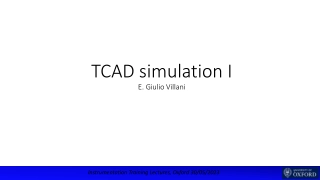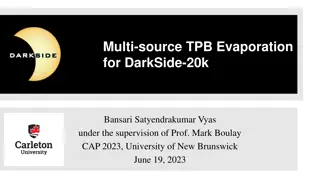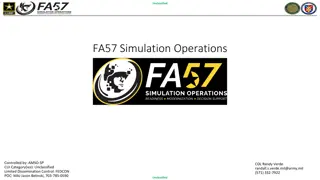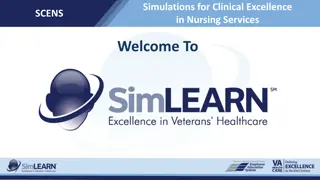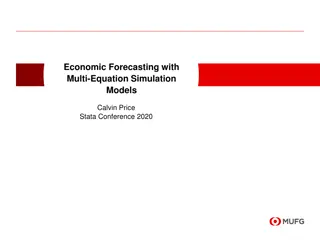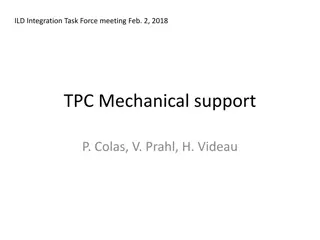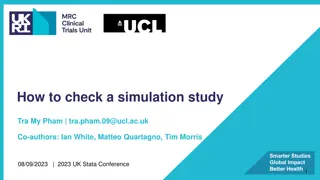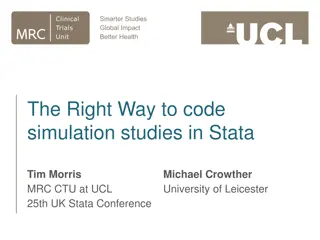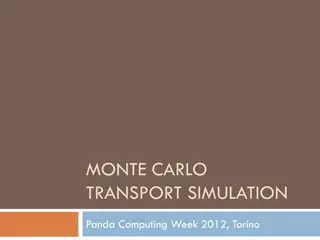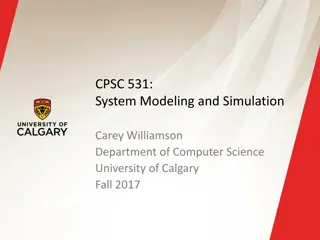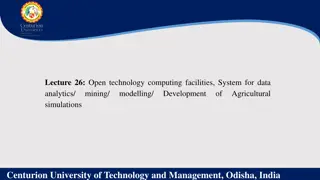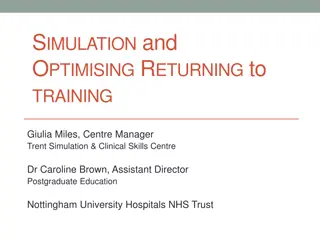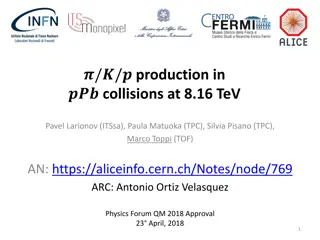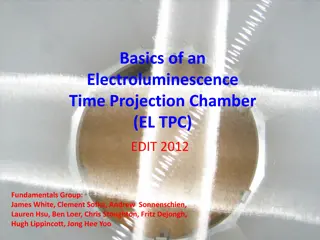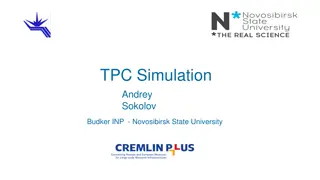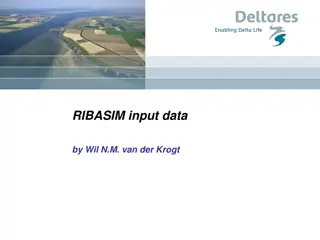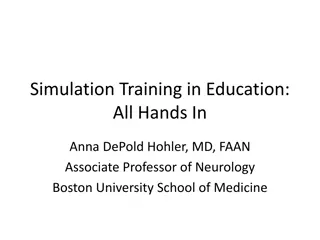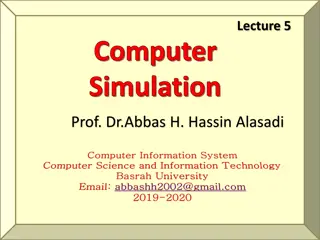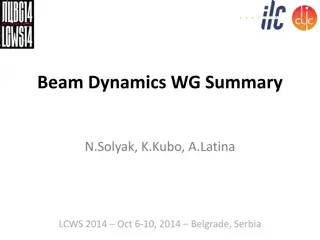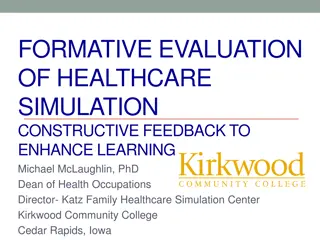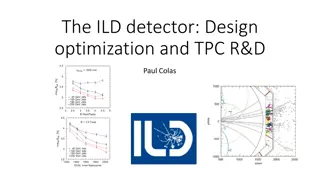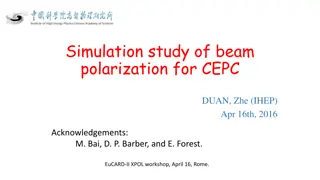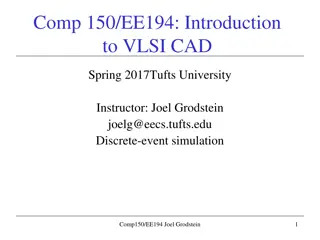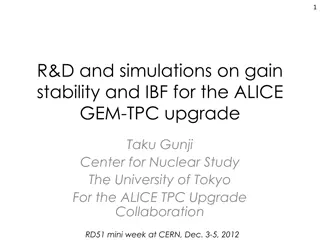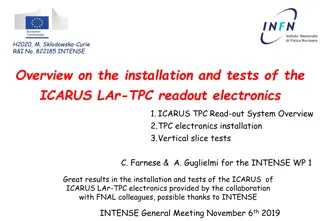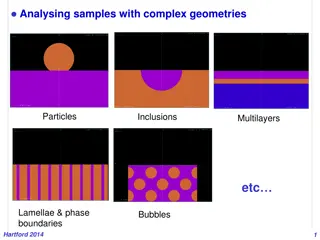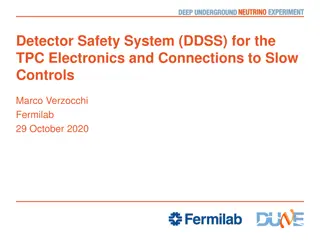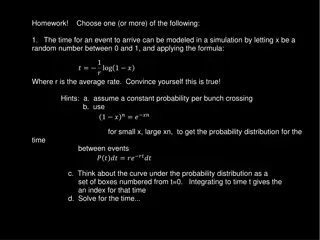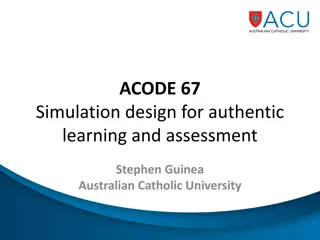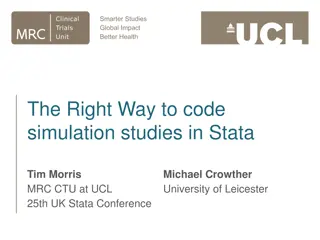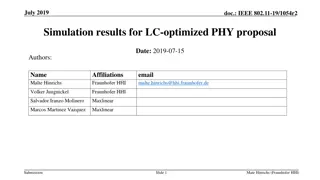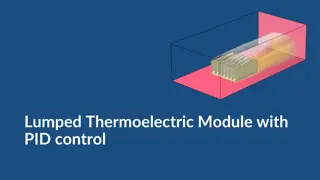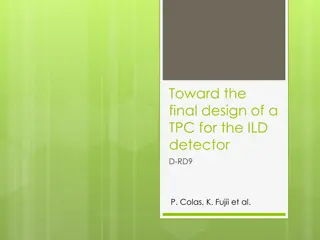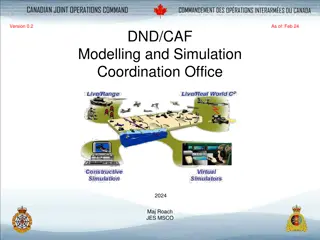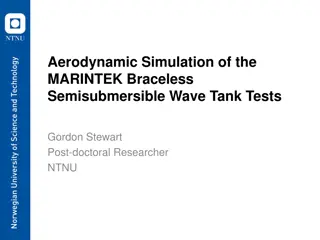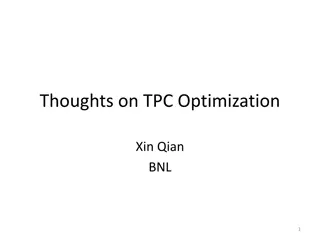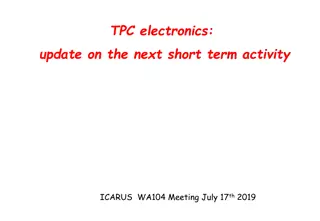TCAD simulation I
TCAD simulation plays a crucial role in the semiconductor industry, allowing for process and device simulations to meet market demands and reduce development time and costs. This involves modeling transport regimes, semiconductor equations, and electromagnetic fields to drive charge flow self-consis
1 views • 29 slides
Exploring Fission Near 198Pb with AT-TPC at FRIB: Insights from Curtis Hunt
Delve into the intriguing world of fission studies near 198Pb using the AT-TPC at FRIB. Supported by the DOE Office of Science, this research probes nuclear structure, fission properties, and fusion-fission reactions. By employing innovative techniques like the Heavy Isotope Tagger and active target
1 views • 39 slides
System Modeling and Simulation Course Overview
This course covers the basics of systems modeling, discrete-event simulation, and computer systems performance evaluation. Topics include Monte Carlo simulation, probability models, simulation output analysis, queueing theory, and more. Professor Carey Williamson leads the course with a focus on pra
4 views • 21 slides
Advanced Technology in Dark Matter Research
Cutting-edge technologies such as multi-source TPB evaporation, LAr TPC, and DarkSide-20k TPC are being utilized in the study of dark matter. These technologies aim to enhance detection sensitivity and uniformity in film coatings, crucial for advancing our understanding of mysterious dark matter par
1 views • 20 slides
Overview of Army Modeling and Simulation Office
The U.S. Army Modeling and Simulation Office (AMSO) serves as the lead activity in developing strategy and policy for the Army Modeling and Simulation Enterprise. It focuses on effective governance, resource management, coordination across various community areas, and training the Army Analysis, Mod
1 views • 8 slides
Simulation-Based Training for Diabetes Care in Nursing
This simulation program, SCENS, focuses on enhancing nursing skills in managing diabetes-related complications such as hyper/hypoglycemia. The learning objectives include assessment, safe care provision, insulin administration, and effective communication. The simulation addresses the significant im
0 views • 17 slides
Understanding Economic Forecasting with Simulation Models
Explore the concept of economic forecasting using multi-equation simulation models, focusing on producing data that follows estimated equations rather than estimating model parameters. Learn about endogenous and exogenous variables, the importance of assumptions in forecasting, and the use of simula
0 views • 38 slides
TPC Mechanical Support Considerations for ILD Integration Task Force Meeting
During the ILD Integration Task Force meeting, discussions revolved around the deformation of the TPC under weight and pressure, fixation points for hanging the TPC, considerations for supporting the TPC with the Cryostat or HCAL, and dealing with potential service clashes. Challenges and preference
0 views • 5 slides
How to Check a Simulation Study: Methods and Considerations
Simulation studies are often used to evaluate statistical methods and study power, but they can sometimes produce misleading results. This work discusses strategies to assess and improve the quality of simulation studies, drawing on experiences and considerations outlined in relevant literature. A s
0 views • 31 slides
Coding Simulation Studies in Stata: A Practical Approach
Understanding simulation studies and their importance in evaluating statistical methods, this presentation delves into the precise coding techniques required in Stata to generate simulated datasets, produce estimates, and analyze performance metrics. With a focus on consistent terminology, data-gene
5 views • 18 slides
Understanding Monte Carlo Transport Simulation
Monte Carlo simulation is a stochastic technique that uses random numbers and probability statistics to investigate and solve problems. In the context of transport simulation, a Monte Carlo program simulates the passage of particles through matter, involving geometry, transport, visualization, detec
0 views • 11 slides
System Modeling and Simulation Overview
This content provides insights into CPSC 531: System Modeling and Simulation course, covering topics such as performance evaluation, simulation modeling, and terminology in system modeling. It emphasizes the importance of developing simulation programs, advantages of simulation, and key concepts lik
0 views • 28 slides
Developing Agricultural Simulation System Using Data Mining Techniques
Development of an agricultural simulation system involves identifying data sources, collecting and integrating data, preprocessing, applying data mining techniques, developing simulation models, calibration, validation, and optimization for performance. User interface development and deployment are
0 views • 4 slides
Enhancing Training Through Simulation Techniques and Optimizing Performance
Simulation techniques play a crucial role in training programs, offering guided experiences that replicate real-world scenarios. By understanding learners' needs, fostering a safe environment, and facilitating debrief sessions, organizations can enhance clinical and procedural skills, teamwork, and
1 views • 12 slides
Production in Collisions at 8-16 TeV: Analysis Overview
Detailed analysis overview of the production in collisions at 8-16 TeV incorporating contributions from Pavel Larionov (ITSsa), Paula Matuoka (TPC), Silvia Pisano (TPC), and Marco Toppi (TOF). The analysis involves the comparison of spectra data to previous datasets, emphasizing the importance of un
0 views • 50 slides
Understanding Electroluminescence Time Projection Chamber (EL TPC) Physics
Delve into the fundamentals of Electroluminescence Time Projection Chambers (EL TPCs) through concepts like electron drift, scintillation mechanisms in noble gases, and charge yield estimation. Explore the workings of EL TPC prototypes, such as ZEPLIN II/III and DarkSide, for applications like react
0 views • 23 slides
Cutting-Edge TPC Simulation Techniques at Budker INP & NSU
Cutting-edge TPC simulation techniques implemented by researchers at Budker INP and NSU include framework implementations, event displays, background simulations, track distortions, and gas medium simulations. Researchers like Andrey Sokolov, Lev Shekhtman, Vijayanand KV, and Timofey Maltsev have co
0 views • 15 slides
Basin Manipulation Simulation Analysis Tool Overview
Basin Manipulation Simulation Analysis Tool provides a comprehensive solution for managing and analyzing basin data, including tasks like basin manipulation, simulation analysis, case management, and defining simulation time steps. The tool allows for easy data entry, visualization of simulation res
2 views • 17 slides
Simulation Training in Education: Enhancing Learning Through Hands-On Simulation
Hands-on simulation training in education provides students with valuable learning experiences by increasing self-reported knowledge and technical proficiency. Simulations help improve students' knowledge, experience, and comfort with challenging procedures in a lower-risk environment, leading to en
0 views • 13 slides
Understanding Computer Simulation and Modeling Tools
Computer simulation and modeling is essential for conducting studies in various fields. Selecting the right simulation language or package is crucial for accurate results. This involves considering the characteristics of the language, such as random number generation, process transformers, list proc
0 views • 7 slides
Advanced Beam Dynamics and Machine Protection in High-Energy Linacs
Overview of recent talks and discussions at LCWS 2014 in Belgrade, Serbia, focusing on machine protection, simulation codes, instrumentation, and system tests. Topics include beam-loss monitors, dark current measurements, simulation code developments, and beam dynamics studies in linacs. Key speaker
0 views • 12 slides
Enhancing Healthcare Simulation Through Constructive Feedback
Explore the principles and benefits of healthcare simulation, focusing on formative evaluation and constructive feedback to improve learning outcomes. Delve into the role of formative assessment tools, TeamSTEPPS model, and Mayo High Performance Teamwork Scale in simulation scenarios. Discover the s
0 views • 37 slides
Advances in ILD Detector Design and TPC R&D
Explore the latest developments in ILD detector optimization and TPC research, focusing on enhancing event reconstruction accuracy and energy resolution. Learn about the ILD concept based on particle flow, the ILD group activities, organizational structure, technical advancements, and TPC readout te
0 views • 22 slides
Beam Polarization Simulation Study for CEPC
Simulation study on beam polarization for the Circular Electron Positron Collider (CEPC) using the PTC Poly- morphic Tracking Code. The study includes orbital and spin tracking, equilibrium polarization calculation, and Monte-Carlo simulation of depolarization rate. Comparison with other Monte-Carlo
0 views • 20 slides
Introduction to VLSI CAD and Discrete-Event Simulation at Tufts University
This course introduces students to event-oriented simulation, building virtual models, and validating designs through simulation. It covers the importance of simulation in testing and refining designs before implementation. Examples include simulating VLSI networks and exploring the use of discrete-
0 views • 32 slides
R&D and Simulations on Gain Stability and IBF for ALICE GEM-TPC Upgrade
The research and development efforts, along with simulations, focus on enhancing gain stability and addressing issues related to Ion Back Flow (IBF) for the ALICE GEM-TPC upgrade. Detailed outline, status updates, and major challenges are discussed, highlighting the significance of the upgrade for i
0 views • 24 slides
Overview of ICARUS LAr-TPC Installation and Testing
Detailed overview of the installation and testing procedures for the ICARUS Liquid Argon Time Projection Chamber (LAr-TPC) readout electronics. The system comprises front-end amplifiers, ADC systems, optical links for data transmission, mini-crates housing the electronics boards, power supplies, and
0 views • 6 slides
Advanced Simulation Techniques for Analyzing Samples with Complex Geometries
Explore the capabilities of PENELOPE simulation software for analyzing samples with intricate structures like particles, inclusions, multilayers, lamellae, and phase boundaries. The software facilitates detailed investigations of material composition and electron-photon transport in diverse geometri
0 views • 28 slides
Detector Safety System (DDSS) for TPC Electronics and Connections to Slow Controls
The Detector Safety System (DDSS) for TPC Electronics involves multiple protection levels including slow controls, PLC-based systems, and fuses/diodes to ensure detector safety. It's crucial to consider these aspects during the design phase as modifications post-design are challenging. The system, d
0 views • 20 slides
Modeling Event Arrival Time in Simulation
Exploring the simulation modeling of event arrival time using a random number formula and understanding the implications through probability distributions and time calculations. Additionally, analyzing small event simulations in STAR DAQ TPC DAQ and discussing data transfer modeling, as well as divi
0 views • 4 slides
Simulation Design for Authentic Learning and Assessment at ACU
Simulation design for authentic learning and assessment is a crucial aspect of education, particularly in the healthcare field. At the Australian Catholic University (ACU), simulation plays a significant role in providing students with authentic experiences that bridge the gap between theory and pra
0 views • 18 slides
The Right Way to Code Simulation Studies in Stata
Simulation studies in Stata involve using (pseudo) random numbers to generate data from a distribution for studying statistical methods. This process helps to evaluate different scenarios and understand the properties of statistical techniques. Key components like ADEMP (Aims, Data-generating mechan
1 views • 18 slides
Simulation Results for LC-Optimized PHY Proposal in July 2019
The document presents simulation results for an LC-optimized PHY proposal for TGbb based on G.9991 PHY. It includes details on the simulation setup, frame detection results, header modulation, coding simulation results, payload modulation, and coding simulation results. The setup involved various re
0 views • 18 slides
Thermoelectric Module with PID Control Simulation
This simulation showcases a lumped thermoelectric module with PID control. The model evaluates the performance of a thermoelectric element in a nonisothermal fluid flow around a heat sink. A stationary simulation assesses the module's capabilities, followed by a transient simulation with a PID contr
0 views • 7 slides
Final Design of ILD Detector TPC - Towards Improved Performance
The final design of a Time Projection Chamber (TPC) for the ILD detector is detailed in this report, showcasing advancements made from 2007 to 2014. The project, D_RD9, focuses on addressing engineering challenges such as electronics, cooling, and software to enhance the TPC's feasibility and functi
0 views • 17 slides
Defense Modeling and Simulation Coordination Office Overview
The Defense Modeling and Simulation Coordination Office (DND/CAF MSCO) is responsible for managing contractors, policies, and strategic activities related to modeling and simulation within the Canadian Armed Forces. The office focuses on supporting various organizations and enhancing capabilities th
0 views • 6 slides
Aerodynamic Simulation of MARINTEK Braceless Semisubmersible: Insights and Tools
Explore the aerodynamic simulation of the MARINTEK Braceless Semisubmersible through advanced techniques and tools. Discover the unique aerodynamic actuator, simulation models, and tools used in the research conducted by Gordon Stewart, a post-doctoral researcher at NTNU. Gain insights into the expe
0 views • 16 slides
Insights on TPC Optimization for Particle Detection
Explore the optimization of Time Projection Chambers (TPC) for particle detection through discussions on basic reconstruction, charge resolution, detector parameters, wire pitch, signal processing, deconvolution techniques, and noise analysis. Gain valuable insights on field and electronics response
0 views • 28 slides
Update on TPC Electronics Activities - July 2019
The upcoming short-term activities for ICARUS WA104 meeting on July 17th, 2019, at TPC Electronics include installation of cables, refurbishment of defective modules, and addressing excess noise issues in mini-crates. Detailed plans for interventions at FNAL from July 24th onwards involve repair act
0 views • 7 slides
Understanding Simulation Types for Ecosystem Modeling
Exploring different simulation types such as continuous and discrete event simulations for modeling complex systems like ecosystems. Detailed discussion on creating an ecosystem simulation with fish and bears on a grid, showcasing actions like breeding, moving, eating, and dying. Overview of a World
0 views • 31 slides
